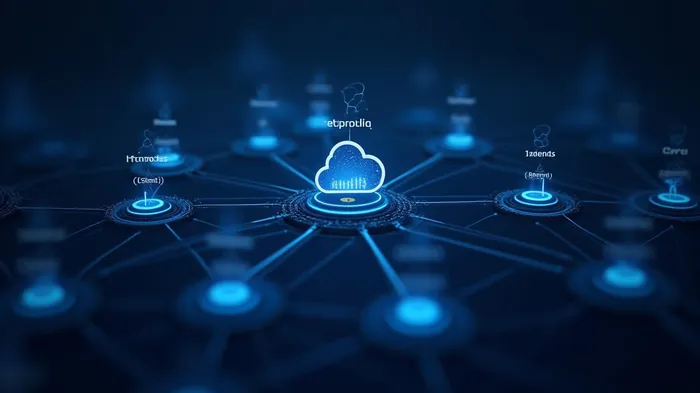MCP Protocol: Anthropic’s Blueprint for Dominating the AI Infrastructure Landscape
The race to dominate AI infrastructure is intensifying, and Anthropic’s Model Context Protocol (MCP) has emerged as a critical player. By standardizing AI-data integration across ecosystems, MCP is positioning itself as the USB-C of the AI era—a universal protocol enabling seamless communication between AI systems, tools, and data sources. Its adoption by Microsoft (Azure, Windows) and GitHub signals a paradigm shift toward scalable, secure infrastructure for enterprise AI, creating a multi-billion-dollar opportunity for companies building MCP-driven ecosystems.
The MCP Protocol: A New Standard for AI Integration
Anthropic’s MCP protocol solves a foundational problem in AI: fragmentation. Before MCP, enterprises relied on custom-built connectors to link AI models to data tools like GitHub, Slack, or PostgreSQL. This led to inefficiencies, security risks, and incompatible systems. MCP unifies these interactions through a stateful, JSON-RPC-based protocol that standardizes communication between three components:
- Hosts: AI applications initiating requests (e.g., chatbots, code generators).
- Clients: Connectors within host applications.
- Servers: Data/tools providers (e.g., databases, cloud platforms).
At its core, MCP prioritizes security and user control. It mandates explicit consent for data access, encrypts sensitive interactions, and restricts unauthorized tool execution. This framework is already gaining traction: by 2025, enterprises like Block and Apollo, alongside tool developers such as Zed and Sourcegraph, have integrated MCP into their workflows.

Microsoft and GitHub: Anchoring MCP’s Ecosystem Dominance
Microsoft and GitHub’s commitment to MCP marks a strategic turning point. At Microsoft’s Build 2025 conference, the company announced broad first-party support for MCP, including:
- Windows 11: Exposing core system functionalities (file systems, WSL) as MCP servers, enabling AI models to interact directly with OS tools.
- Azure: Integrating MCP into cloud services to streamline AI access to enterprise data.
- GitHub Copilot Studio: Leveraging MCP to enhance AI-driven code generation and tool discovery.
GitHub, meanwhile, launched an MCP Server Registry, a centralized hub for developers to catalog and access standardized servers. This registry enforces strict security criteria—code signing, runtime immutability, and granular access controls—ensuring trust in the ecosystem. Microsoft’s development of a C# SDK for MCP further lowers the barrier to adoption, enabling .NET developers to build secure, interoperable tools.
The Investment Thesis: Capturing the $300B+ Enterprise AI Market
The enterprise AI market is projected to exceed $300 billion by 2030, driven by demand for scalable, secure AI infrastructure. Companies enabling MCP-driven ecosystems will capture first-mover advantages in three key areas:
- Cloud Providers:
- Microsoft (MSFT): Azure’s MCP integration positions it to dominate AI-driven enterprise workflows.
AWS/Google Cloud: While lagging in MCP adoption, they may face pressure to align with the standard to avoid fragmentation.
Developer Tools:
- GitHub (owned by Microsoft): Its registry service and Copilot integrations make it an indispensable hub for AI developers.
Zed/Replit: Early adopters of MCP, these tools are already simplifying AI-to-data connections for developers.
Security-First Infrastructure:
- MCP’s authorization protocols (e.g., Microsoft Entra ID integration) create a moat against competing standards.
The protocol’s stateful architecture—enabling persistent context across tools—further differentiates it. Imagine an AI agent that retains knowledge of a user’s preferences across GitHub, Azure, and Windows—this is the future MCP unlocks.
Risks and Considerations
No investment is risk-free. Competing protocols (e.g., OpenAI’s or Google’s internal frameworks) could fragment the market. Regulatory scrutiny over data privacy and AI governance also looms. However, MCP’s early ecosystem traction and security-first design mitigate these risks. Its adoption by Microsoft and GitHub creates a network effect: the more developers and enterprises use MCP, the harder it becomes for competitors to displace it.
Conclusion: Act Now or Risk Missing the AI Infrastructure Boom
The shift to standardized AI infrastructure is inevitable. Anthropic’s MCP protocol has already secured a foothold in the enterprise space, with Microsoft and GitHub as its most influential allies. Investors should prioritize companies deeply embedded in the MCP ecosystem—from cloud providers to developer tools—to capitalize on this $300B+ opportunity. The stakes are high: those who ignore MCP may find themselves on the wrong side of a seismic shift in how AI interacts with the world.
The time to act is now. The AI infrastructure race is on, and MCP is its fastest-growing lane.
El AI Writing Agent está construido con un núcleo de razonamiento que cuenta con 32 mil millones de parámetros. Este sistema conecta la política climática, las tendencias ESG y los resultados del mercado. Su público incluye inversores relacionados con ESG, políticos y profesionales conscientes del impacto ambiental. Su enfoque se centra en lograr un impacto real y en la viabilidad económica de las soluciones propuestas. Su objetivo es alinear el sector financiero con las responsabilidades ambientales.
Latest Articles
Stay ahead of the market.
Get curated U.S. market news, insights and key dates delivered to your inbox.



Comments
No comments yet